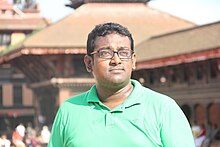Mahmudul Haque Munshi
Mahmudul Haque Munshi ( Bengali মাহমুদুল হক মুন্সী ; * 1987 in Jessore , Bangladesh ) is a Bengali blogger , atheist humanist and human rights activist. After attempted murder by Islamists, he came to Germany on a scholarship in autumn 2015 . He has been a member of the board of secular refugee aid since 2020 .
Life
Mahmudul Haque Munshi is a blogger born in Bangladesh in 1987 and one of the main activists of the secular Shabag movement that emerged in 2013, which was founded by supporters of the Islamic State (IS), Al-Qaeda on the Indian subcontinent (AQIS), Jamaat-e-Islami and the Ansarullah Bangla Team (ABT) is fought. He survived several murder attempts but lost friends who were hacked to death with machetes in offices and on the street. According to the FAZ, the government did not protect the bloggers and activists - but instead accused the victims of denigrating Islam. At the time he received support from Reporters Without Borders , the Heinrich Böll Foundation , the Center for Inquiry and Amnesty International . Since then, his name has been on a "Global Hit List", which lists the names of Bengali refugees abroad who are to be killed. The German wave quoted him in the article "Atheism is dangerous" with the statement: "The other day I got on my Facebook page in a single day 4500 death threats."
In autumn 2015 he came to Germany with his wife, who had worked for the Terre des Hommes children's aid organization in Bangladesh . In the Times of India , he said that while he was on the Islamist murder list and leaving Bangladesh, he would never remain silent as it meant the victory of the fundamentalists.
In Germany, he has since spoken out on issues of human rights, freedom of expression and Islam, among others, at panel discussions, Re: publica , Deutsche Welle, materials and information on the time (MIZ) , city review and podcast Aethervox Ehrenfeld. Poetry is one of his areas of interest.
In May 2020 he was elected to the board of the Secular Refugee Aid eV. He said that it was in Germany's own long-term interest, in countries like Bangladesh and Mauritania , which received a lot of German development aid and in which there was strong religious oppression and people like him were being forced to flee, not to hide away and remain silent: " Otherwise, Germany will strengthen the religious fundamentalists who are betting on the abolition of democracy and the spread of Sharia and not us, who as secular democrats advocate freedom of expression and universal human rights. "
See also
Web links
Individual evidence
- ↑ Deutsche Welle (www.dw.com): শাহবাগের চেতনা আজও প্রদীপ্ত কোটি বাঙালির হৃদয়ে | DW | 12/02/2015. Retrieved May 29, 2020 (bn-BD).
- ↑ Staff Correspondent, bdnews24.com: Avijit Roy's publisher Dipan hacked to death at Shahbagh hours after attack on another publisher. Retrieved May 29, 2020 .
- ↑ Till Fähnders, Dhaka: Violence against bloggers: anxious waiting for the next murder . In: FAZ.NET . October 12, 2016, ISSN 0174-4909 ( faz.net [accessed May 29, 2020]).
- ↑ Astrid Prange De Oliveira: Atheism is life-threatening | DW | December 19, 2018. Deutsche Welle (www.dw.com), December 19, 2018, accessed on May 29, 2020 (German).
- ↑ Daniela Wakonigg: Secular blogger from Bangladesh: "It was a nightmare". hpd.de, November 14, 2016, accessed on May 29, 2020 .
- ↑ Priyanka Dasgupta | TNN | Aug 8, 2015, 07:02 am Is: I was the target, but they killed Niloy: Blogger | Kolkata News - Times of India. Retrieved on May 29, 2020 (English).
- ↑ Gisa Bodenstein: Doesn't it have something to do with Islam? hpd.de, November 19, 2018, accessed on May 29, 2020 .
- ↑ Blogger Power! | International Federation of Non-Denominational and Atheists eV (IBKA). Retrieved May 29, 2020 .
- ↑ Mahmudul Haque Munshi: Freedom of Expression on Religion: The center point of Tension Between Radical Islamist Groups and Their opposition in Bangladesh. republica, 2016, accessed May 29, 2020 .
- ↑ Peter Hille: Interview with Mahmudul Haque Munshi | DW | December 19, 2018. Deutsche Welle (www.dw.com), December 19, 2018, accessed on May 29, 2020 (German).
- ↑ Mahmudul Haque Munshi: Mahmudul Haque Munshi, author of materials and information at the time. Retrieved on May 29, 2020 (German).
- ↑ Karin Clark: "The sculpture of Lalon, the singer: The movement of the Bangla culture: My sore heart? ..." by Mahmudul Haque Munshi. Stadtrevue Verlag, July 27, 2016, accessed on May 29, 2020 .
- ↑ AVE # 291: Mahmudul Haque Munshi. Podcast Aethervox Ehrenfeld, December 9, 2019, accessed on May 29, 2020 (German).
- ↑ Aachener Zeitung: Langenbroich: Poetry as a language to process what has been experienced. Retrieved May 29, 2020 .
- ↑ Mahmudul Haque Munshi on the board of secular refugee aid - Atheist Refugee Relief. Retrieved on May 29, 2020 (German).
| personal data | |
|---|---|
| SURNAME | Munshi, Mahmudul Haque |
| BRIEF DESCRIPTION | Bengali blogger, atheist humanist and human rights activist |
| DATE OF BIRTH | 1987 |
| PLACE OF BIRTH | Jessore , Bangladesh |
